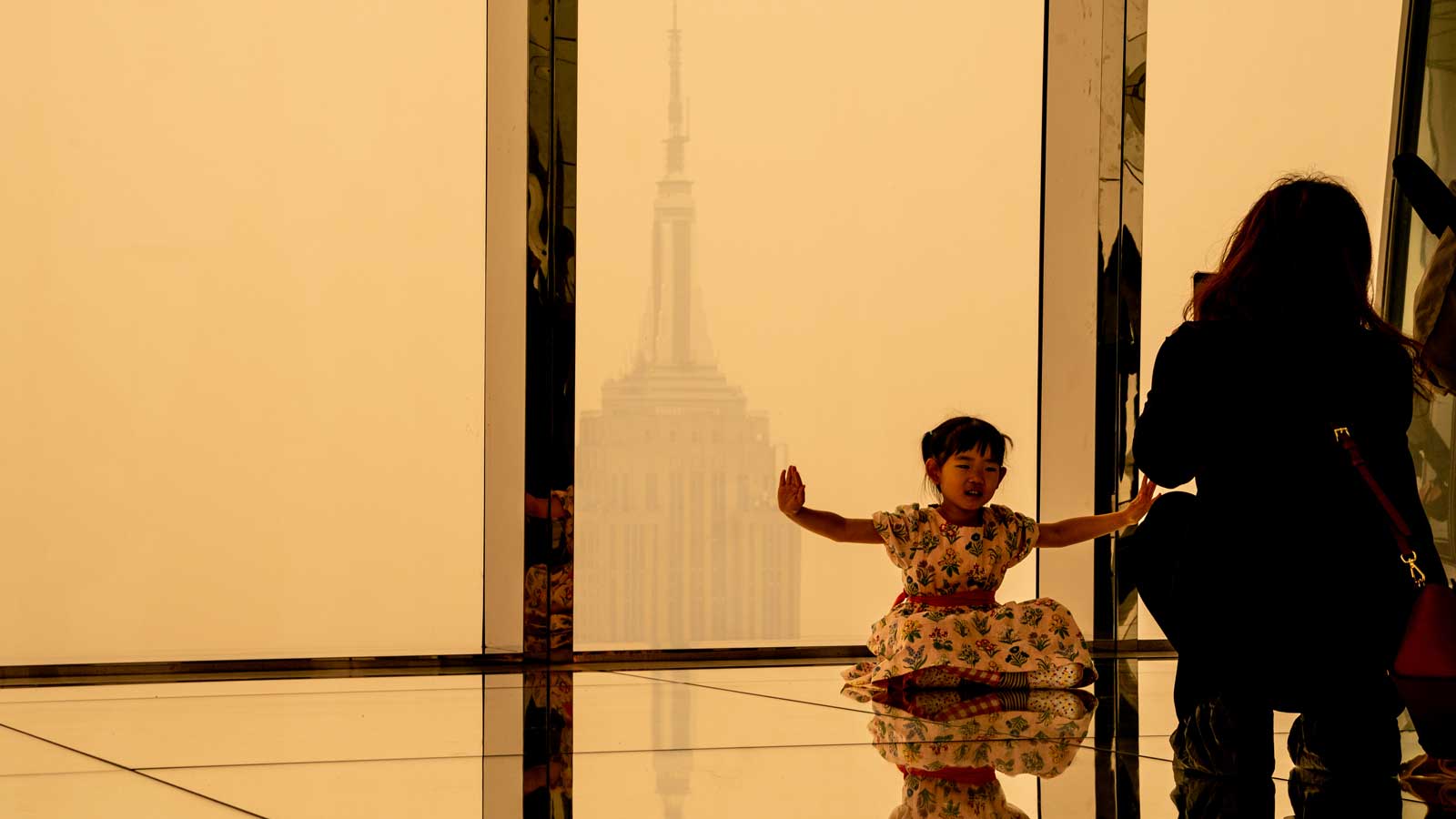How local weather change harms youngsters’s well being

The fondest occasions of my childhood had been the annual burst of flowers every spring. Not so for my youngsters, who sniffle and sneeze their method by way of pollen season.
With common temperatures rising hotter, timber right here in Atlanta are flowering earlier within the yr, blooming longer, and releasing extra pollen than after I was a child.
That’s led to what I’ve dubbed FOGO — “Concern of Going Exterior” — for my youngsters.
They stay with weeks of nasal congestion, sleepless nights, tears, frustration, missed days of college, poor efficiency on spring exams, and this yr, a refusal to go outdoors throughout college — nearly a whole month of college recesses spent sitting inside alone with a instructor as a substitute of taking part in outdoors with classmates.
Once I talk about these experiences with different dad and mom in my circle, many share the identical sentiment. They, too, are feeling FOGO, together with a companion emotion I name “FOLGO” — Concern of Letting (them) Go Exterior” throughout days of utmost warmth or air high quality alerts in a warming and traffic-congested Atlanta.
“They’re simply extra scared to go outdoors,” a pal informed me not too long ago amid record-high mid-spring warmth and humidity in Georgia. “And fairly actually, a whole lot of occasions I don’t wish to allow them to go play outdoors both.”
For mates in New York Metropolis, smoke from large Canadian wildfires not too long ago added one more local weather menace, with clearly seen proof of danger from hazy air air pollution.
And mates in Texas have been sweltering beneath a weekslong report warmth wave, making outside time oppressive for his or her youngsters.
Why concentrate on youngsters’s well being?
In her latest e-book, “Youngsters’s Well being and the Peril of Local weather Change,” Frederica Perera shares the scientific proof behind the altering local weather’s impacts on the bodily and psychological well being of fetuses, infants, and youngsters.
Perera, a professor of environmental well being sciences on the Mailman College of Public Well being and director of the Heart for Youngsters’s Environmental Well being at Columbia College, notes that just about each youngster throughout the globe is already in danger from no less than one local weather change-related menace.
Excessive warmth, compromised air high quality and air pollution, and the unfold of disease-carrying mosquitoes and ticks to new areas are only a subset of threats that infants and youngsters face over a lifetime.
However Perera doesn’t see dad and mom as helpless. “I would like folks to know that there’s a lot that they’ll do as people in their very own lives to turn into advocates for youngsters’s well being,” she says. Dad and mom can be taught extra concerning the dangers to their youngsters’s bodily and psychological well being, take motion to guard their native environments, and vote for climate-smart measures that may enhance well being within the brief and long run.
Youngsters are uniquely vulnerable to the well being impacts of local weather change
From the earliest moments of life, local weather change can have a significant impression on well being. Earlier than a fetus is born, excessive temperatures improve the chance of untimely start. In later years, warmth can have an effect on a toddler’s capacity to be taught and will increase the chance for psychological well being situations.
Local weather change degrades air high quality by way of quite a lot of pathways — by lengthening and intensifying allergy seasons and growing the frequency of wildfires with large smoke plumes, for instance.
And a bunch of things improve the chance of climate-related environmental impacts on the well being of kids, Perera says.
On the whole, youngsters usually tend to spend time outdoor and usually tend to be bodily lively when they’re outdoors. Each can improve their publicity to excessive temperatures and polluted air.
Fetuses, infants, and youngsters are additionally extra weak due to their quickly creating our bodies. Early growth is a extremely choreographed and significant window when poisonous exposures can have long-lasting bodily, psychological, and cognitive well being penalties. Additionally it is a time when their our bodies’ capacity to metabolize poisonous chemical substances, regulate inner temperature, and mount a sturdy immune protection towards infectious illness continues to be immature.
Youngsters are additionally uniquely weak as a result of they’re principally depending on the care of others. From making certain hydration, ensuring they cool off at common intervals, holding them away from poisonous exposures, and taking measures to restrict publicity to insect bites, caregivers play an enormous function in minimizing the dangers to a toddler’s well being.
Dangers to youngsters in marginalized and low-income communities are even increased and compounded by extra stressors like poverty, lack of entry to wholesome meals, and structural racism. In these communities, youngsters typically wouldn’t have the luxurious of FOGO, with already disproportionate publicity to air air pollution and warmth and disproportionate charges of persistent sickness that may additionally compromise the immune response.
How poor air high quality harms well being
Shut to twenty% of kids in america undergo from hay fever, which makes longer and extra intense allergy seasons fueled by local weather change notably brutal. Excessive pollen counts may cause far more than merely nuisance signs like runny noses, congestion, and sneezing, with lack of sleep and declines in class efficiency a rising menace to well-being. For kids with bronchial asthma, the dangers from allergen publicity can result in increased charges of emergency room visits.
Wildfires supercharged by local weather change are more and more compromising air high quality throughout the globe. Within the U.S., near 7.4 million youngsters breathed in air polluted by wildfire smoke yearly between 2008 and 2012, in response to a latest examine. Throughout being pregnant, these exposures have been related to preterm start and low start weight. In youngsters, research have proven hyperlinks between wildfire smoke publicity and bronchial asthma flares, pneumonia, and bronchitis.
Perera says that air pollution akin to nitrogen oxides and particulates are a parallel menace, precipitated primarily by the identical fossil gas combustion sources that causes local weather change.
Lots of the hyperlinks to poor well being are nicely documented however some dangers are simply rising. Not solely does air air pollution set off bronchial asthma flares, however we now know that sure forms of air air pollution also can trigger bronchial asthma within the first place. Together with injury to the lungs, air air pollution can improve the chance of toddler dying, preterm start, and low start weight, and hurt to the creating mind, which may trigger long-term impairment to immune operate, well being, and mental growth.
Air air pollution additionally impacts the construction and performance of the mind, with hyperlinks to decreased cognitive skills and a spotlight deficit-hyperactivity dysfunction. New research additionally recommend a hyperlink with psychological well being situations like anxiousness and melancholy in youngsters and adolescents.
What dad and mom can do
Kari Nadeau, a pediatrician and chair of environmental well being at Harvard College, desires to counsel households concerning the local weather dangers to the well being of their youngsters, even earlier than start.
“If dad and mom know the dangers … we will forestall them within the youngster’s lifetime at an early stage by intervening early and by making an impression with some options,” Nadeau says.
She says that regardless of the dangers, time spent outdoors is without doubt one of the most essential investments dad and mom could make within the bodily and psychological well being of their youngsters. Together with masking, timing outside exercise appropriately and following public well being steering on poor air high quality days or excessive pollen and excessive warmth index days could make it doable for most youngsters to benefit from the outdoor safely.
Nadeau urges dad and mom to transform their youngsters’s FOGO and, maybe their very own FOLGO, into motion. “It’s essential for us to know the dangers as a result of that ought to compel us and catalyze us to alter them,” she says. “We don’t have to simply be sitting round passively and ready for the globe to heat.”
In her e-book, Perera describes quite a few examples of profitable native, state, and country-level interventions the world over which have helped to chop carbon emissions and poisonous air air pollution, made neighborhoods extra bearable within the setting of utmost warmth, and improved entry to secure outside time.
One concrete step is to do all you’ll be able to to make your native outside setting safer. Teams that interact in native tree plantings and advocate for equitable inexperienced house can assist neighborhoods climate intense warmth waves and reduce native air air pollution to a sure extent.
Advocating for a shift to electrical college bus fleets also can assist clear up the native setting.
Issues for “local weather proofing” your own home can be very protecting if it’s worthwhile to keep indoors. Transitioning to an induction range can assist decrease indoor pollutant ranges. If a range change will not be within the finances, stand-alone induction cooktops is perhaps a cheap selection. Sealing cracks and investing in a HEPA air filter can be protecting.
Lastly, Nadeau encourages dad and mom to strengthen their youngster’s bodily and psychological well being. This implies go outdoors, hike and play, eat wholesome plant-based meals, be bodily lively, encourage restorative sleep to construct resilience within the face of escalating local weather threats.
“I feel that ensuring that we function mannequin … make certain they know that our lovely planet is price it and we have to ensure that we care for it,” Nadeau says.




